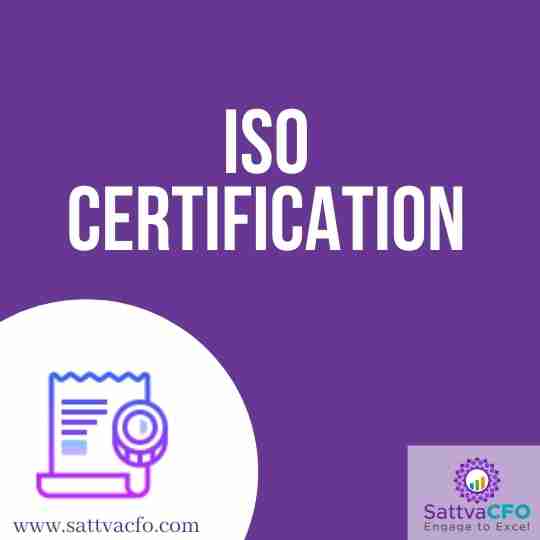Process of ISO Certification in India
The International Organization for Standardization (ISO) stands for International Organization for Standardization. It is a non-profit organisation that sets standards for businesses’ products and services in terms of quality, safety, and efficiency. With increasing business competition, it’s more important than ever to deliver high-quality goods and services in order to stay competitive. ISO certification helps to boost your company’s credibility as well as its overall efficiency – in India – Full Form & Meaning
Prerequisites to the ISO certification process.
In India, there are some prerequisites to the ISO certification process.
Choosing an ISO Certification Type
First and foremost, you must determine the type of ISO certification that your company requires. ISO certification comes in a variety of forms, including:
- Quality Management System (ISO 9001:2008)
- Environmental Management System (ISO 14001)
- Information Security Management (ISO 27001) is an international standard for information security management.
- ISO 22008 – Food Safety Management, for example.
Selecting an ISO Certification Organization
It is important to note that ISO does not provide certification to businesses. External bodies are in charge of certification. It is critical that you select a reputable and well-known certification body. Keep the following points in mind when selecting an ISO registrar:
Compare and contrast a number of ISO Certification service providers.
Check to see if they are adhering to the CASCO guidelines. CASCO is an ISO committee that deals with conformity assessment issues.
Check to see if it is accredited. Although accreditation is not required, it is required that they meet the requirements of ISO Accreditation bodies.
India’s ISO Certification Process
Make a contract/application
A contract should be reached between the applicant and the registrar. This contract usually spells out both parties’ rights and obligations, as well as issues like liability, confidentiality, and access.
Review of High-Quality Documents
The ISO auditor will examine all of your quality manuals and documents pertaining to the organization’s various policies and procedures. Review of existing work will help the ISO auditor to identify the possible gaps against the requirements stipulated in the ISO standards.
Make a Action Plan
You should prepare an action plan to close the gaps in your organisation after the ISO auditor has communicated them to you. Prepare a list of the tasks that must be completed in order to achieve the desired changes in your organisation. It is possible that you will be required to provide training to your employees in order for them to work efficiently while adapting to new procedures. Make sure that all employees are aware of the ISO standards for work efficiency and quality.
Audit for Initial Certification
Stage 1 and Stage 2 are the two stages of the initial certification audit.
Stage 1: The ISO auditor will examine the changes you’ve made to the company. They’ll then try to find any non-conformities in your systems and procedures that aren’t in line with the desired quality management system. These non-conformities will be divided into minor and major non-conformities. The applicant must carefully assess all of these non-conformities and ensure that they are aligned with the desired quality standards by modifying the organization’s techniques and processes.
Stage 2: After the organisation has made all of the necessary changes, the ISO auditor conducts the final audit. According to ISO quality standards, the auditor will check whether all non-conformities have been eliminated. If the ISO auditor is satisfied, the final ISO audit report will be prepared and sent to the registrar.
Getting ISO Certification
Obtaining ISO Certification is the final step in the process.
The registrar will award you ISO certification once all non-conformities have been addressed and all findings have been documented in the ISO audit report.
Audits of Surveillance
The purpose of a surveillance audit is to check that the firm is adhering to ISO quality requirements.
It takes place on a regular basis.
ISO Certification Fees
The ISO Certification Process has a price tag attached to it – – in India – Full Form & Meaning
The cost of ISO certification is not set in stone and varies from company to company. The ISO certification agency assesses the cost of ISO certification for each organisation separately, taking into account several factors such as: – in India – Full Form & Meaning
- Employees’ number
- Processes Performed
- Risk level related with the breadth of the organization’s services
- The management system’s complexity
- The number of shifts worked, and so on.
- The ISO Certification Process takes time.
The time it takes to complete the entire certification procedure varies from company to company. After assessing the size of the company, the certification agency can provide a reasonable estimate. The following is an estimate of how long it takes to complete the certification process:
- 6–8 months for small businesses
- 8-12 months for medium-sized businesses
- 12-15 months for a large organisation
FAQ
Who needs ISO certification?
ISO 9001:2015 is applicable to all businesses, regardless of their size or industry. The ISO 9001 standard criteria have been applied to quality management systems by over one million enterprises from over 160 countries.
What is the difference between ISO and ISO certification?
ISO certificate verifies that a management system, manufacturing process, service, or documentation procedure meets all of the standards and quality assurance requirements. To maintain consistency, ISO standards have been established. Each certification has its own set of standards and requirements, as well as a numerical classification.
What does ISO certification mean?
“ISO certified” signifies that a company’s business processes have been designed, maintained, and improved through time. This is done by comparing and measuring business performance against relevant quality standards.
Is ISO a legal requirement?
Although there is no legal requirement to follow ISO standards, they are widely accepted in many businesses. Furthermore, ISO accreditation conveys the impression that the company follows particular quality standards when creating and manufacturing products and services.




